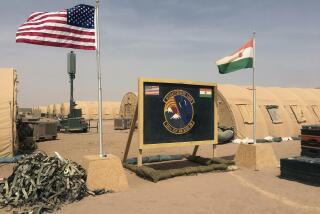O.C. Marines Ready, Willing for Iraq Action
- Share via
TUSTIN — Staff Sgt. Stanley Jones returned from the Persian Gulf just three weeks ago, but the 30-year-old Marine said Wednesday that he’s ready to go back if that’s what it takes to get Iraq to comply with the United Nations’ orders.
While Jones was just adjusting to civilian life, other Marines who never went to the Gulf reacted eagerly to word that the United States might send airplanes and troops back to Saudi Arabia if Iraqi President Saddam Hussein continues to impede U.N. inspectors.
“I’d be glad to go this time,” said El Toro Marine Cpl. Chuck Jones, 21. “I missed out on the last one, and I am ready to go.”
Both the Tustin and El Toro Marine Corps air stations operated normally Wednesday. All questions about the status of the two local bases were referred to the Pentagon in Washington.
“We don’t discuss alerts and we don’t have any statement beyond what Mr. (Dick) Cheney said this morning,” a spokeswoman at the Department of Defense said.
Secretary of Defense Cheney said earlier in the day that the Pentagon was considering options and cautioned against inferring that military action against Iraq was imminent.
The 3rd Marine Aircraft Wing headquartered at El Toro played a major role in the bombing missions and the ground war that defeated the Iraqi army and forced it to retreat from Kuwait. Nearly 8,000 Marines from El Toro and Tustin fought in Desert Storm without a battlefield death.
U.S. military personnel in the Gulf region have shrunk from 540,000 at the height of the Gulf War to about 33,000. But they are capable of launching assaults.
Retired Maj. Gen. Donald E. P. Miller, a former wing commander at El Toro, speculated that it would be “very unlikely” that Marine Corps aviators would be sent initially to Saudi Arabia or the Persian Gulf area for either escort or bombing purposes.
He said the Air Force still has F-15s and F-16s based in Turkey, and their pilots are familiar with the air bases in Saudi Arabia.
Miller also pointed out that Marine aircraft wings have a primary responsibility to their ground troops and the jet fighters and helicopters probably would not move without those troops.
In an interview outside the Tustin helicopter base, Sgt. Jones, 30, said he had nearly readjusted himself to life in the United States.
“I just got back a couple of weeks ago,” he said. “If I’ve got to go, if that’s what it takes, then I will go.”
His unit went to the Persian Gulf early last December and remained on ships for weeks as part of the famous amphibious “feint” force that held thousands of Iraqi soldiers at bay along the Kuwaiti coastline.
Altogether, Jones’ squadron--made up of CH-46 and CH-53E helicopters--spent 270 days away from home. They returned Aug. 27.
Cpl. Manuel Rodriguez, 22, arrived at his squadron at El Toro after it had left for Saudi Arabia. “What more can we say than we are ready to go,” Rodriguez said. “That’s what we are here for.”
More to Read
Sign up for Essential California
The most important California stories and recommendations in your inbox every morning.
You may occasionally receive promotional content from the Los Angeles Times.













